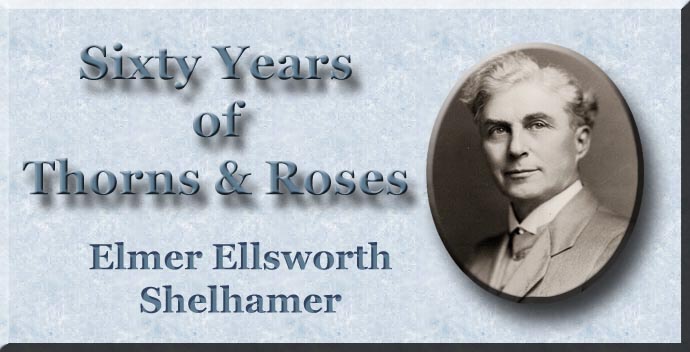
60 Years of Thorns & Roses
By Elmer Ellsworth Shelhamer
Part II
Chapter 40
ZEAL WITHOUT KNOWLEDGE
I always did admire zeal rather than formality in religion. My father taught me, "What is worth doing at all is worth doing well." This remained with me, and somehow when I got religion I got it all over, and later, when I entered the ministry, naturally took to the radical rather than the conservative element. I will here relate an incident which occurred shortly after I began to preach. I had read and heard how Lorenzo Dow, Peter Cartwright and others were used of God in reproving and awakening sinners. One day, while in a certain town, I was walking and saw a man coming toward me. I was suddenly impressed with the thought that I must warn him of the coming judgment. Just as he was about to pass, I reached out my hand and, taking hold of his shoulder, said: "Dear man, you are going to the judgment, and where will you spend eternity?" No answer was given and he walked on. Presently I glanced back; he had stopped and was looking at me. I rejoiced and thought, "You are struck with conviction as with a lightning bolt out of a clear sky." Perhaps he was and perhaps he was not. He may have been wondering what fanatic had just escaped from the asylum. It doubtless would have been just as effectual to have first greeted him, or given him a tract, then delivered the message. Sometimes a little thing like a tract will introduce one and open the way for a personal conversation. Well, what did this teach me? It taught me that there is no special virtue in being blunt and abrupt. It taught me that in order to be "free from the blood of all men," I need not be discourteous. It taught me that if God has used eccentric and outspoken men in the past it was because they were simple enough to let Him use them, and perhaps they might have been more mightily used had it not been for some of their crude peculiarities. Another lesson: As I began to travel more extensively I saw that men were going to hell by the carloads, and felt I must do something to rescue them; accordingly, I always carried a lot of leaflet tracts for distribution in the trains, depots, etc. But here was my mistake: Upon entering a train or boat I could not feel restful and easy until I had first "done my duty" toward the salvation of all on board. Hence I proceeded to distribute tracts and sometimes gave a few pointed words of exhortation. If I thought that the captain or conductor might object, I made it a point to go either ahead of or behind him so as not to encounter him. Sometimes he was enraged, but I rejoiced that I had been persecuted for righteousness' sake, not thinking that possibly it might be for my own lack of wisdom. It remained for me to find the secret of distributing tracts and performing other cross-bearing duties with ease and naturalness. Here was the divine plan: Upon entering a train or any other public conveyance, I was not to get agitated or in a hurry, but first take my seat in a restful, praying mood and believe God to be more interested in the salvation of souls than I possibly could be: this being true, I could afford to hold myself in readiness and be glad to be an errand boy for Jesus. I was to have no preconceived program, but at such an instant as the Holy Spirit might say, "Now is the time," go forward without a moment's hesitation and trust God for consequences. And what did this teach me? It taught me that there is no galling yoke attached to the leadings of the Spirit. It may mean opposition or self-denial, but there is a buoyancy and holy delight in that direction. How different are the drivings of Satan! You feel you "must do your duty," but, oh, what a dread and strain are associated with it! It also taught me that I must be myself in God. I was not to be like Jehu, Peter Cartwright or any one else, but like Jesus. He is the perfect example. I am aware there are two kinds of dispositions. One gets ahead of the Spirit, and the other lags behind. One is ever ready to take hold and do something, though in an awkward way, while the other sits back and looks wise, excusing himself that he is not called to such juvenile work. Some men, like some horses, need to be held back that they may live longer and have more reserve force for special occasions. Perhaps this suits my case. Others need to get a move on them and do something. Yes, d something! I mean you, you "easy-going, namby-pamby, goody good-for-nothing" sort of fellow, wake up and do something, even if you do stumble love yourself while doing it. |
|
 |
 |
|
|
|
-
Site Navigation
 Home
Home What's New
What's New Bible
Bible Photos
Photos Hiking
Hiking E-Books
E-Books Genealogy
Genealogy Profile
Free Plug-ins You May Need
Profile
Free Plug-ins You May Need
 Get Java
Get Java.png) Get Flash
Get Flash Get 7-Zip
Get 7-Zip Get Acrobat Reader
Get Acrobat Reader Get TheWORD
Get TheWORD